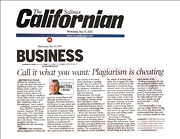Integrity Matters
May 10, 2006
Call it what you want: Plagiarism is
cheating

 Question: (E-238)
Question: (E-238)
Dear Jim:
William H. Swanson is the 57 year-old chief executive
of Raytheon, a multi-billion dollar military contractor. He
serves on the board at Sprint Nextel. He was just "outed" for
plagiarizing. Why would a rich and powerful guy
stoop so low? His "Unwritten Rules of Management" were
copied - sometimes word for word - from the 1944
writings of another engineer, W.J. King, who wrote "The
Unwritten Laws of Engineering." Where
is Swanson's integrity?
 Response:
Response:
Your questions about plagiarism confirm the need for
an intelligent and effective architecture of integrity,
in many areas of our society. Powerful individuals
fall prey to ego, greed and self-inflicted lies. These
folks believe their own press clippings. Restoring social
and emotional integrity requires a behavior-shaping framework. And
here is a reason why: can you name a profession
or enterprise that has not been tainted by corruption
or malfeasance? Human beings need clear guidelines
with meaningful consequences.
Two recent plagiarism stories underscore this widespread disease in our society. Is
the issue about cheating or getting caught? For too many it is the latter. Swanson's
behavior at Raytheon was wrong and so too the sophomore at Harvard College, Ms.
Kaavya Viswanathan, whose now infamous debut-novel, was little more than a cut-and-paste
job. Downloading the work of others, without attribution, is dishonest. Yes,
mistakes can be made - but not a whole book's worth.
The Bracher Center for Integrity was launched, in 2002,
because we recognized that values such as integrity,
perseverance, and commitment were being averaged-down
in a misguided search for consensus and convenience. It
is fundamentally wrong to accept that to get along you
always have to go along. The excesses of a few
appear to have punished the whole of society, including
the moral confidence way too many people. Prevailing
structures promote the politics of convenience over the
commitment of leadership, quality or integrity. Too large
a part of the business community enjoys the excesses
of luxury as it continues to drift from quick deals to
devastating dishonesty, winking as rules, laws and constructive
values are ignored.
According to President Theodore Roosevelt: "The
things that will destroy America are prosperity at any
price, peace at any price, safety first instead of duty
first, the love of soft living, and the get-rich-quick
theory of life."
Any thinking adult understands that "integrity is
one of several paths; distinguishing itself from the others
because it is the right path and the only one upon which
you will never get lost." --
M.H. McKee. The
harsh reality is that success comes before work, but only
in the dictionary. If achievement was that easy,
then everyone would be rich and famous. Integrity, in all
activities, is the best policy.